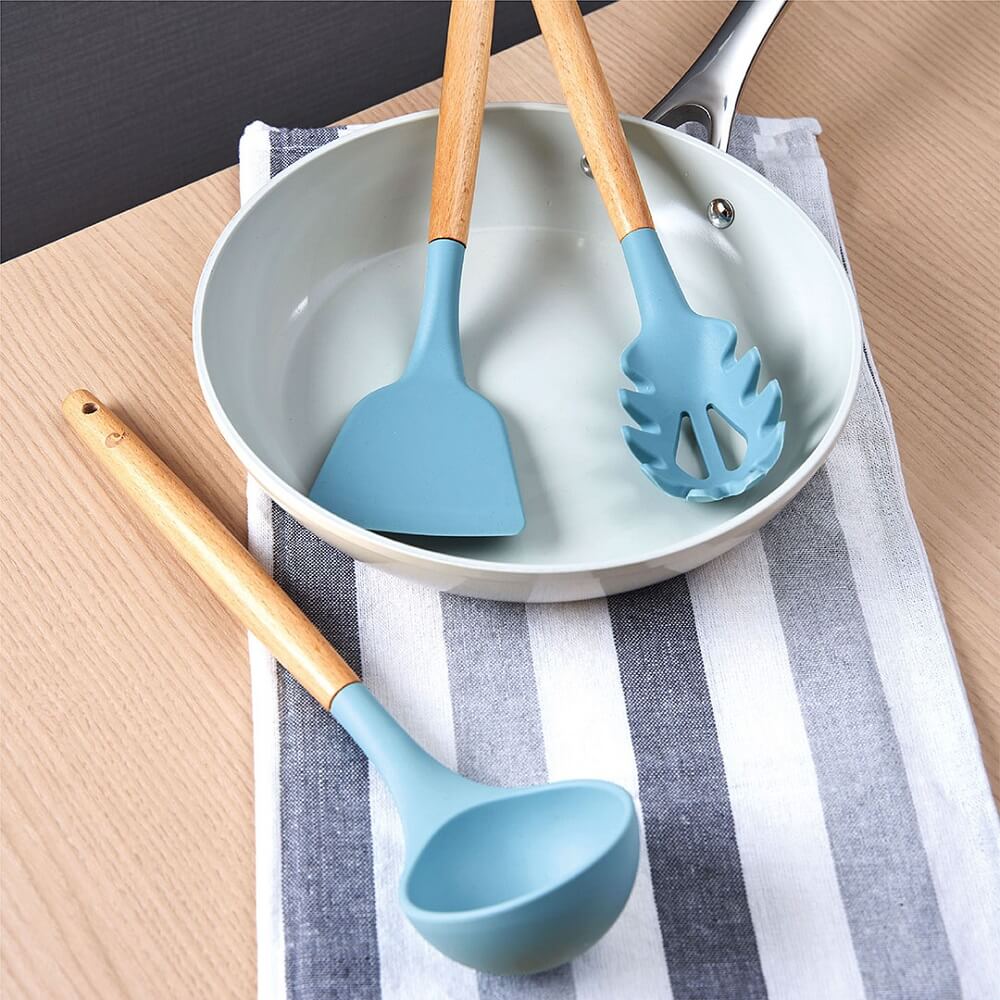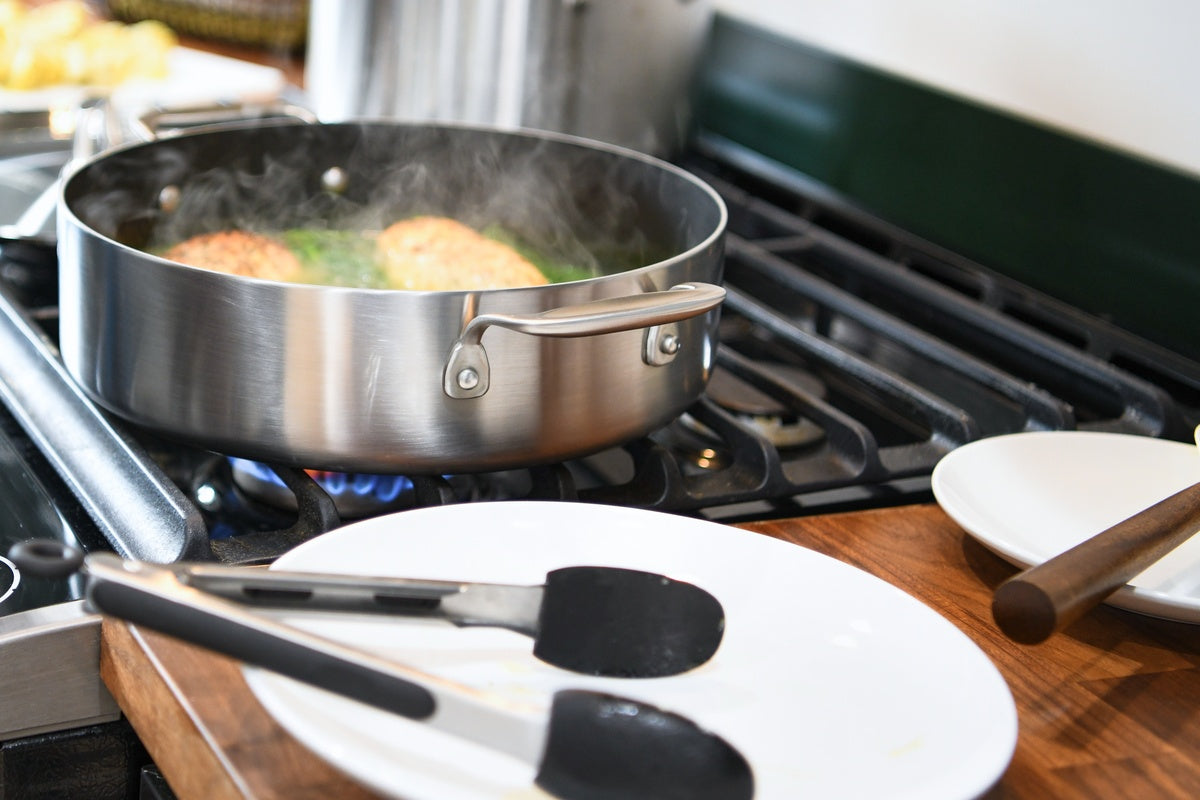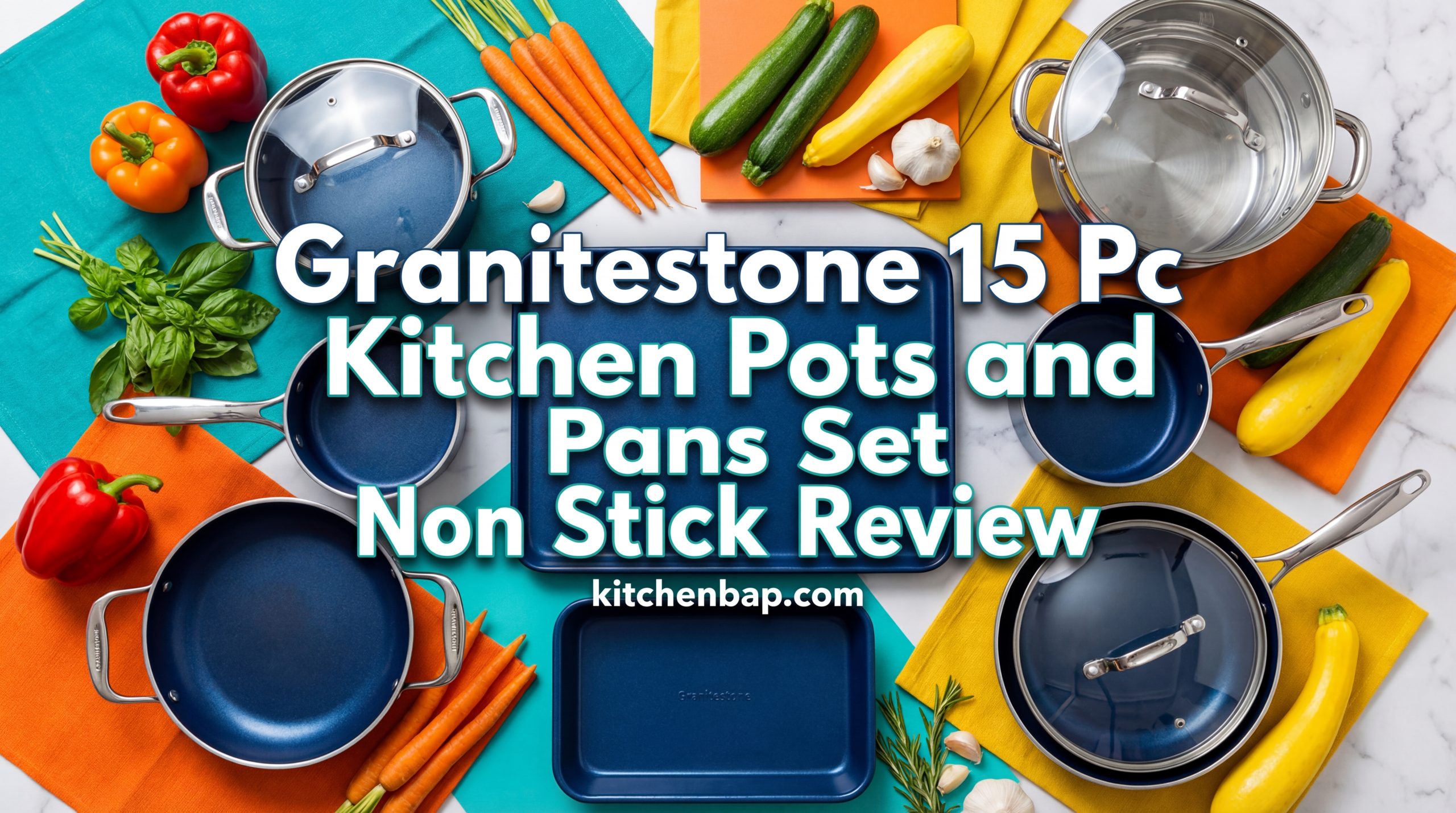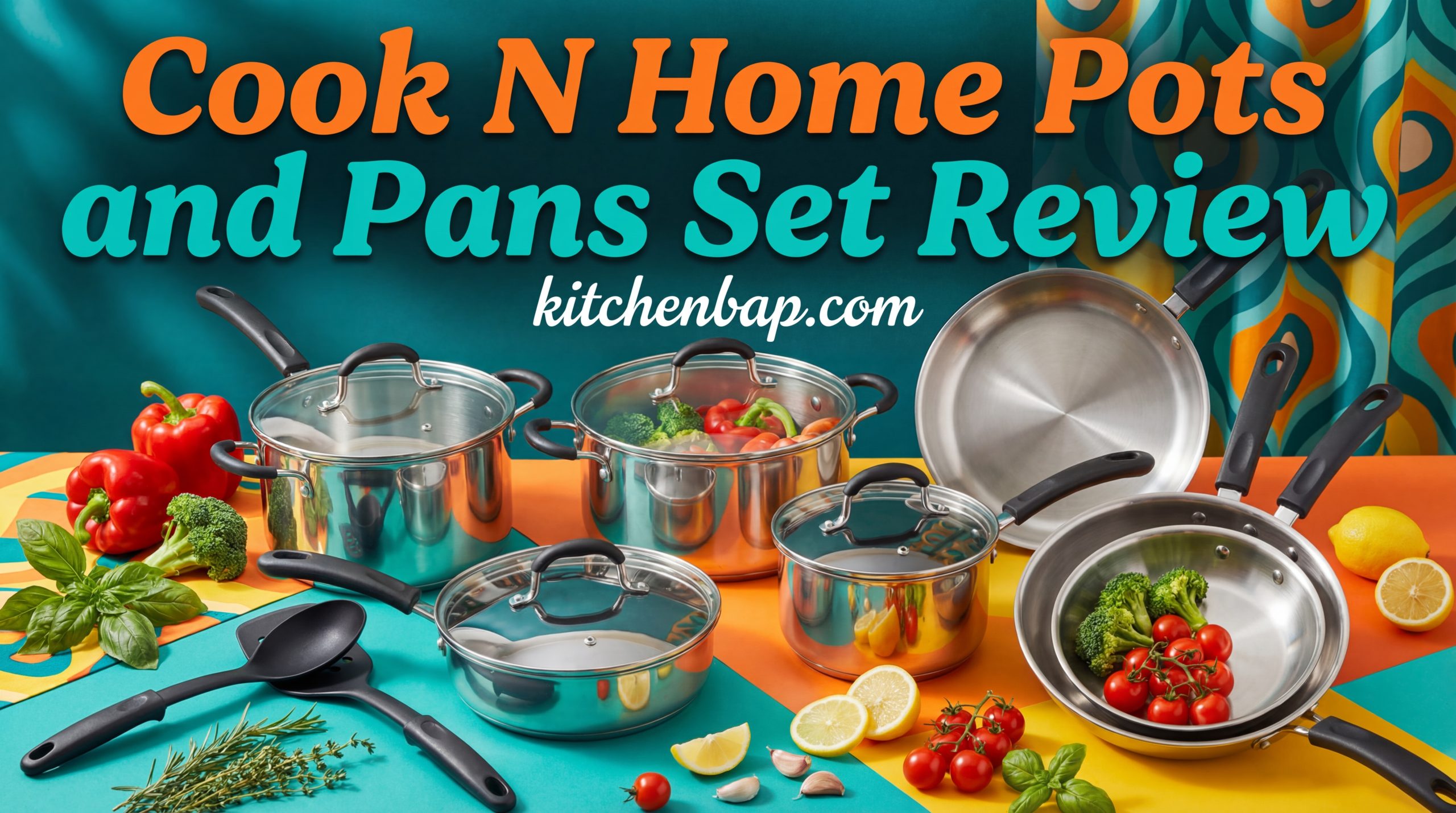Nonstick cookware utensils have become a staple in many kitchens. Their convenience and ease of use make cooking simpler and more enjoyable.
These utensils allow food to slide off easily, reducing the need for excessive oil or butter. This not only makes meals healthier but also speeds up the cooking process. Cleaning up is easier, too; food residue tends to wipe away effortlessly.
Whether you’re frying eggs, sautéing vegetables, or simmering sauces, nonstick utensils can enhance your cooking experience. They come in various materials, designs, and sizes, catering to different cooking needs. Understanding how to choose the right nonstick cookware utensils can help you make informed decisions. This guide will explore the best options available and what to consider when selecting them.
The Rise Of Nonstick Cookware
Nonstick cookware has changed how we cook. It makes cooking easier and cleanup faster. This trend started many years ago and keeps growing. Let’s explore its journey from early inventions to modern kitchens.
Early Inventions And Innovations
The story of nonstick cookware began in the 1930s. A scientist named Roy Plunkett discovered a new material called Teflon. This material had special properties. It was slick and prevented food from sticking.
In 1954, Teflon was used to coat frying pans. This made cooking a lot easier. Cooks loved it. They could fry eggs without sticking. Soon, many companies began making nonstick pans.
Over the years, manufacturers improved nonstick coatings. They made them more durable. Some even created ceramic-coated cookware. These innovations made nonstick options popular in every kitchen.
Popularity In Modern Kitchens
Today, nonstick cookware is everywhere. Millions of homes use it. Chefs and home cooks enjoy its benefits. It allows for healthier cooking with less oil.
- Easy to clean
- Less oil needed for cooking
- Durable and long-lasting
- Available in various styles and sizes
Nonstick pans also come in many types. Here are some popular choices:
| Type | Material | Best For |
|---|---|---|
| Traditional Nonstick | Teflon | Frying and sautéing |
| Ceramic Coated | Ceramic | Healthier cooking |
| Hard-Anodized | Aluminum | Durability |
Nonstick cookware continues to rise in popularity. It offers convenience and ease. This cookware is a must-have for today’s kitchens.
Benefits Of Using Nonstick Utensils
Nonstick utensils offer many advantages in the kitchen. They make cooking and cleaning easier. Here are some key benefits.
Effortless Food Release
One major benefit is the effortless food release. Nonstick surfaces help food slide out easily. This means fewer dishes stuck to the bottom. It saves time and frustration.
- Perfect for delicate foods like eggs and pancakes.
- Reduces the need for scrubbing pots and pans.
- Helps in maintaining the shape of food.
With nonstick utensils, cooking becomes more enjoyable. Less mess means quicker clean-up. This feature is great for busy cooks.
Minimized Cooking Oil Usage
Another benefit is the minimized use of cooking oil. Nonstick surfaces require less fat for cooking. This helps in preparing healthier meals.
| Cooking Method | Traditional Utensils | Nonstick Utensils |
|---|---|---|
| Frying Eggs | 1-2 tablespoons oil | 1 teaspoon oil or none |
| Cooking Pancakes | 1 tablespoon butter | 1 teaspoon butter |
| Sautéing Vegetables | 1-2 tablespoons oil | 1 tablespoon oil |
Using less oil helps in weight management. It also reduces calories in meals. Nonstick utensils support healthier cooking habits.
Key Varieties Of Nonstick Coatings
Nonstick cookware makes cooking easier. Different coatings offer various benefits. Understanding these options helps in choosing the right cookware for your needs.
Teflon: The Household Name
Teflon is the most recognized nonstick coating. It is made from polytetrafluoroethylene (PTFE). This coating helps food slide off easily.
Here are some key points about Teflon:
- Durable: Teflon is long-lasting if used properly.
- Easy to Clean: Just wipe with a sponge.
- Heat Resistance: Safe up to 500°F (260°C).
- Affordable: Usually cheaper than other coatings.
Be cautious. Using metal utensils can scratch the surface. Always use wooden or silicone tools.
Ceramic Coatings: The Eco-friendly Option
Ceramic coatings are a popular choice for eco-conscious cooks. They are made from sand and do not contain PTFE. This makes them a safer option for many.
Consider these benefits of ceramic coatings:
- Non-Toxic: Free from harmful chemicals.
- High Heat Tolerance: Can withstand high temperatures without releasing fumes.
- Stain Resistant: Food does not stick easily.
Ceramic coatings may wear out faster than Teflon. Proper care extends their lifespan. Avoid using sharp utensils to keep them in good condition.
Essential Nonstick Cookware For Every Kitchen
Nonstick cookware makes cooking easier and cleaner. It helps food cook evenly and prevents sticking. Every kitchen needs essential nonstick items to prepare delicious meals. Let’s explore the must-have nonstick cookware.
Frying Pans And Skillets
Frying pans and skillets are vital in any kitchen. They are perfect for frying, sautéing, and browning. The nonstick surface reduces the need for oil.
- Ideal for eggs, pancakes, and stir-fries.
- Lightweight and easy to handle.
- Available in various sizes.
Choose a frying pan with a sturdy handle. Look for one that is oven-safe. Nonstick frying pans save time on cleanup. Here are some popular sizes:
| Size | Best For |
|---|---|
| 8 inches | Single servings |
| 10 inches | Family meals |
| 12 inches | Large batches |
Saucepans And Stockpots
Saucepans and stockpots are essential for sauces, soups, and stews. Nonstick options prevent food from burning. They make cooking easier and quicker.
- Great for boiling pasta or making sauce.
- Perfect for cooking grains like rice or quinoa.
- Available in various depths and widths.
Choose a saucepan with a lid for steaming. Stockpots are excellent for large meals. Check for sturdy handles for safe lifting. Here’s a quick guide to sizes:
| Size | Best For |
|---|---|
| 1.5 quarts | Small sauces |
| 3 quarts | Medium soups |
| 6 quarts | Large stews |
Care And Maintenance Of Nonstick Utensils
Nonstick cookware is popular for its convenience. Proper care and maintenance can help keep it in good shape. Simple steps ensure your utensils last longer. Here, we discuss essential tips for cleaning and protecting your nonstick utensils.
Cleaning Do’s And Don’ts
Cleaning nonstick cookware requires special care. Follow these do’s and don’ts for best results:
| Do’s | Don’ts |
|---|---|
| Use soft sponges or cloths. | Avoid steel wool or harsh scrubbers. |
| Wash with mild dish soap. | Don’t use abrasive cleaners. |
| Clean after each use. | Never leave food residue on the surface. |
| Dry thoroughly with a soft towel. | Avoid air drying if possible. |
Protecting The Coating Longevity
To protect your nonstick cookware, follow these tips:
- Use utensils made of silicone, wood, or plastic. Metal utensils can scratch the surface.
- Store carefully. Place cloth or paper between stacked items to prevent scratches.
- Heat on low or medium. High heat can damage the nonstick coating.
- Avoid cooking sprays. They can leave a residue that’s hard to clean.
By following these tips, you can enjoy your nonstick cookware for years. Proper care keeps the coating intact. This ensures your meals cook evenly and easily.

Credit: www.amazon.com
Safety Concerns And Myths
Nonstick cookware is popular in many kitchens. Yet, it raises questions about safety. Many myths surround its use. Understanding these concerns helps you cook safely.
Debunking Nonstick Cookware Myths
Several myths about nonstick cookware can mislead consumers. Here are some common ones:
- Myth 1: Nonstick coatings are toxic.
- Myth 2: All nonstick pans contain harmful chemicals.
- Myth 3: Nonstick cookware is not durable.
Most nonstick coatings are safe. They are made without harmful chemicals. High-quality brands use safer materials. Understanding these facts can ease your worries.
Safe Cooking Temperatures And Practices
Using nonstick cookware safely requires proper techniques. Follow these guidelines:
- Use low to medium heat. High temperatures can damage the coating.
- Avoid metal utensils. Use wood or silicone instead.
- Keep your cookware clean. Regular maintenance extends its life.
- Do not preheat an empty pan. Always add food or oil first.
Keeping these practices in mind helps you enjoy safe cooking. Nonstick cookware can be a great choice when used correctly.
The Best Brands In Nonstick Cookware
Choosing the right nonstick cookware can be confusing. Many brands offer a variety of options. Some are known for their quality and durability. Others focus on affordability. Here are some of the best brands available today.
Top Picks For Durability
Durability is key in nonstick cookware. You want your pots and pans to last. Here are some top brands that excel in durability:
| Brand | Material | Warranty |
|---|---|---|
| Calphalon | Hard-Anodized Aluminum | Lifetime Warranty |
| All-Clad | Stainless Steel with Nonstick Coating | Limited Lifetime Warranty |
| GreenPan | Ceramic Nonstick | Limited Lifetime Warranty |
These brands use high-quality materials. They offer excellent heat distribution. This helps prevent warping and scratching.
Value For Money Brands
Some brands offer great quality without breaking the bank. Here are a few that provide good value:
- T-fal: Known for its affordable pricing and good performance.
- Farberware: Offers reliable cookware at budget-friendly prices.
- AmazonBasics: Simple, effective options for everyday cooking.
These brands focus on functionality. They provide solid nonstick surfaces. Perfect for everyday meals without spending too much.

Credit: cosmiccookware.com.au
Upcoming Innovations In Nonstick Technology
Nonstick cookware is evolving. New technologies promise better performance and safety. These changes focus on durability, health, and the environment.
Next-generation Coatings
Manufacturers are developing advanced nonstick coatings. These coatings aim to last longer and resist scratching. Some key features include:
- Enhanced Durability: New materials withstand high temperatures.
- Improved Release Properties: Food slides off easily.
- Scratch Resistance: Less wear and tear over time.
Many brands use ceramic-based coatings. These are free from harmful chemicals. They offer a natural nonstick surface. Some options are even dishwasher safe.
Sustainable And Health-conscious Developments
Environmental concerns drive new innovations. Many companies focus on sustainable materials. These materials reduce waste and pollution. Some key trends include:
- Biodegradable Coatings: Safe for the environment.
- Recyclable Materials: Cookware that can be reused.
- Healthier Alternatives: Free from toxic substances.
Consumers want safer products. Nonstick cookware is responding. The future looks promising for eco-friendly options.

Credit: www.wayfair.com
Frequently Asked Questions
What Are Nonstick Cookware Utensils Made Of?
Nonstick cookware utensils are typically made from materials like Teflon, ceramic, or anodized aluminum. These materials provide a smooth, nonstick surface that allows for easy food release and cleaning. They are designed to withstand high temperatures while ensuring your food doesn’t stick, promoting healthier cooking with less oil.
How To Care For Nonstick Cookware?
To care for nonstick cookware, avoid using metal utensils to prevent scratches. Hand wash with a soft sponge and mild detergent instead of abrasive cleaners. Always allow the cookware to cool before washing it to maintain the nonstick coating. Proper care will extend the life and performance of your utensils.
Can Nonstick Cookware Be Used On High Heat?
Most nonstick cookware is not suitable for high heat cooking. High temperatures can damage the nonstick coating and release harmful fumes. It’s best to use nonstick utensils on low to medium heat for optimal performance and safety. Always check the manufacturer’s instructions for specific temperature guidelines.
Is Nonstick Cookware Dishwasher Safe?
Not all nonstick cookware is dishwasher safe. Many manufacturers recommend hand washing to preserve the nonstick surface. Dishwashers can expose cookware to harsh detergents and high heat, which may degrade the coating. Always refer to the care instructions to ensure the longevity of your nonstick utensils.
Conclusion
Choosing the right nonstick cookware utensils makes cooking easier. They help food cook evenly and clean up quickly. With many options available, pick what suits your needs best. Look for durable materials that last. Proper care will keep them in good shape.
Enjoy cooking and sharing meals with loved ones. Quality utensils enhance your kitchen experience. Make your cooking enjoyable and stress-free. Nonstick cookware is a smart choice for every home. Happy cooking!





Leave a Reply